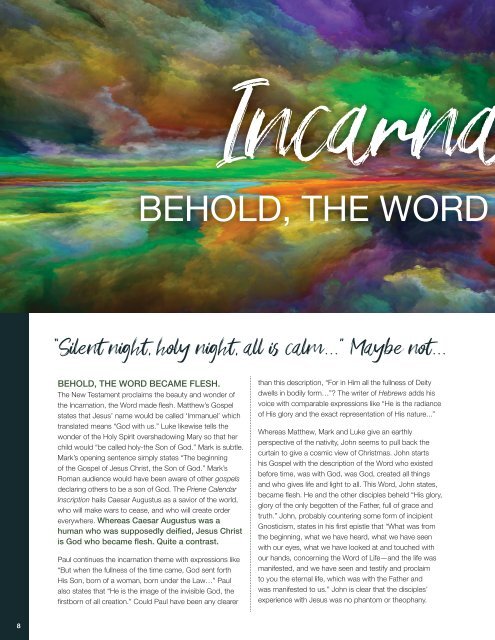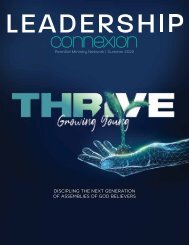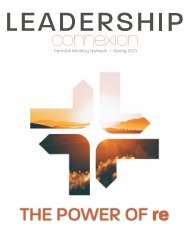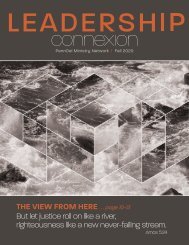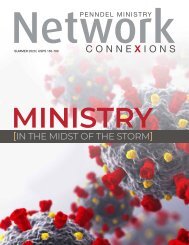Leadership Connexion Winter 2022
You also want an ePaper? Increase the reach of your titles
YUMPU automatically turns print PDFs into web optimized ePapers that Google loves.
Incarnat<br />
BEHOLD, THE WORD B<br />
“Silent night, holy night, all is calm...” Maybe not...<br />
BEHOLD, THE WORD BECAME FLESH.<br />
The New Testament proclaims the beauty and wonder of<br />
the Incarnation, the Word made fl esh. Matthew’s Gospel<br />
states that Jesus’ name would be called ‘Immanuel’ which<br />
translated means “God with us.” Luke likewise tells the<br />
wonder of the Holy Spirit overshadowing Mary so that her<br />
child would “be called holy-the Son of God.” Mark is subtle.<br />
Mark’s opening sentence simply states “The beginning<br />
of the Gospel of Jesus Christ, the Son of God.” Mark’s<br />
Roman audience would have been aware of other gospels<br />
declaring others to be a son of God. The Priene Calendar<br />
Inscription hails Caesar Augustus as a savior of the world,<br />
who will make wars to cease, and who will create order<br />
everywhere. Whereas Caesar Augustus was a<br />
human who was supposedly deified, Jesus Christ<br />
is God who became flesh. Quite a contrast.<br />
Paul continues the incarnation theme with expressions like<br />
“But when the fullness of the time came, God sent forth<br />
His Son, born of a woman, born under the Law…” Paul<br />
also states that “He is the image of the invisible God, the<br />
fi rstborn of all creation.” Could Paul have been any clearer<br />
than this description, “For in Him all the fullness of Deity<br />
dwells in bodily form…”? The writer of Hebrews adds his<br />
voice with comparable expressions like “He is the radiance<br />
of His glory and the exact representation of His nature...”<br />
Whereas Matthew, Mark and Luke give an earthly<br />
perspective of the nativity, John seems to pull back the<br />
curtain to give a cosmic view of Christmas. John starts<br />
his Gospel with the description of the Word who existed<br />
before time, was with God, was God, created all things<br />
and who gives life and light to all. This Word, John states,<br />
became fl esh. He and the other disciples beheld “His glory,<br />
glory of the only begotten of the Father, full of grace and<br />
truth.” John, probably countering some form of incipient<br />
Gnosticism, states in his fi rst epistle that “What was from<br />
the beginning, what we have heard, what we have seen<br />
with our eyes, what we have looked at and touched with<br />
our hands, concerning the Word of Life—and the life was<br />
manifested, and we have seen and testify and proclaim<br />
to you the eternal life, which was with the Father and<br />
was manifested to us.” John is clear that the disciples’<br />
experience with Jesus was no phantom or theophany.<br />
8


